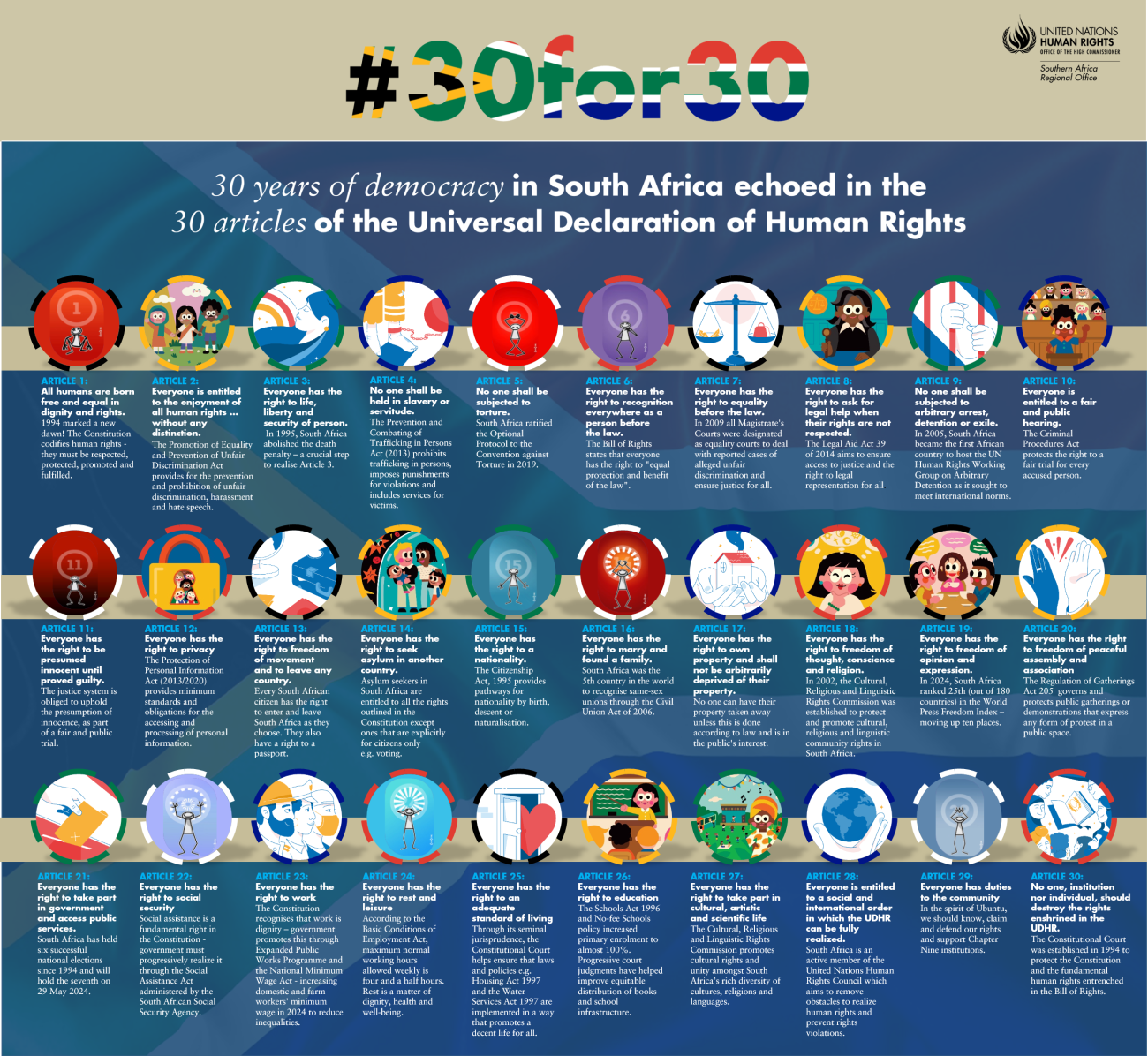Living and striving for human rights for all: 30 years of SA Democracy

The UDHR is still the blueprint for the way forward – with the solutions to the challenges in standing up for the human rights of everyone everywhere.
South Africa’s 30-year democratic journey is a powerful story; a tale woven with the threads sacrifice, dignity and of the Universal Declaration of Human Rights (UDHR). In this celebratory year of the country’s own long walk to freedom, the UN Human Rights Regional Office for Southern Africa, spotlighted the profound connection between democracy and the UDHR with the #30for30 online campaign.
#30for30 took place during March, Human Rights Month 2024. Through a series of daily tweets, the campaign underscored how each article of the UDHR resonates with key aspects of South Africa’s journey towards a more inclusive and equitable society.
"We initiated the #30for30 campaign to highlight the enduring relevance of the UDHR in the context of South Africa's democratic evolution," said UN Human Rights Regional Representative Abigail Noko. "It is an opportunity to celebrate milestones while also acknowledging the work that lies ahead in upholding human rights for all."
The UDHR underpins a great deal of the country’s democratic trappings. Much of the Constitution is based on the articles and it was a goal and guidebook for those seeking freedom and equality. Former President Nelson Mandela told the UN General Assembly (UNGA) the country’s democracy stood on the shoulders of the UDHR.
“For those who had to fight for their emancipation, such as ourselves who, with your help, had to free ourselves from the criminal apartheid system, the Universal Declaration of Human Rights served as the vindication of the justice of our cause,” he said to the UNGA during 50th anniversary commemorations for the UDHR. “At the same time, it constituted a challenge to us that our freedom, once achieved, should be dedicated to the implementation of the perspectives contained in the Declaration.”
Delving into the intersections between the UDHR and South African democracy reveals interesting parallels. One of the key principles of the UDHR is non-discrimination, which is enshrined in Article 2, which states “Everyone is entitled to the enjoyment of all Human Rights...without any distinction.” Non-discrimination is a fundamental aspect of human rights, ensuring that everyone is treated fairly and equally regardless of background. The #30for30 campaign linked the article with the Promotion of Equality and Prevention of Unfair Discrimination Act (PEPUDA), which South Africa passed in 2000.
Similarly, Article 21 which states everyone has the right to take part in government and access public services, was linked to the country’s six successful national elections since 1994 in the campaign.
"The UDHR is the leitmotif to South Africa’s bill of rights and constitutional democracy. It is a moral and visionary compass that guides our work to promote and protect human rights in the country," Noko said.
As the nation celebrates 30 years of democracy and progress, it is important to acknowledge the challenges that still remain. Economic disparities persist and apartheid still casts a long shadow in many areas including education and social inclusion. But the UDHR is still the blueprint for the way forward – with the solutions to the challenges in standing up for the human rights of everyone everywhere.
Want to learn more about the UDHR? Please go to our website: www.ohchr.org. And check out the #30for30 campaign and other human rights content by following us on Twitter/X
Like what you see? The #30for30 graphic accompanying this story is available as a commemorative poster. You can download it here: https://bit.ly/4aMtF80



